Your Cart is Empty
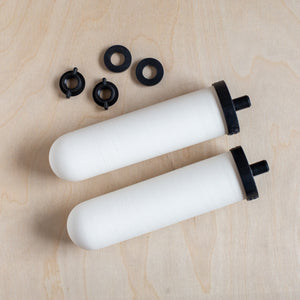
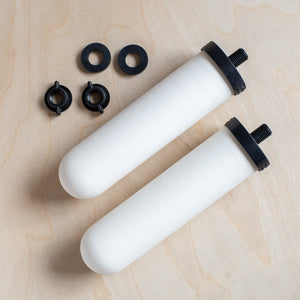
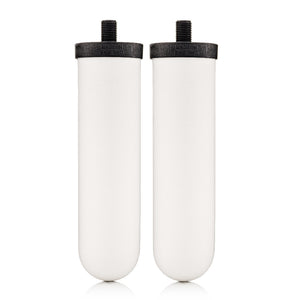
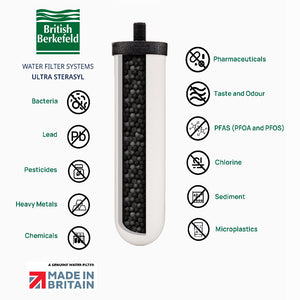
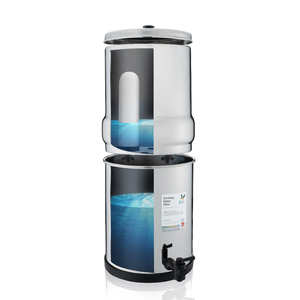
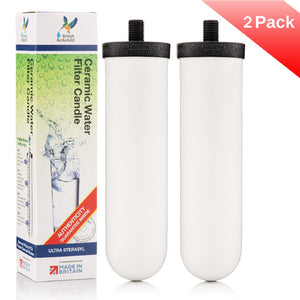
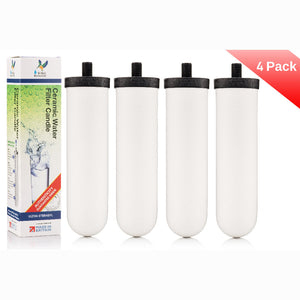
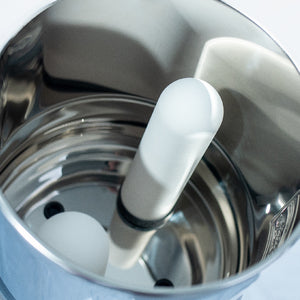
British Berkefeld Ultra Sterasyl replacement filters for gravity systems
$57.00 - $114.00
These are the most advanced ceramic gravity filters made by Britsh Berkefeld.
They fit in the British Berkefeld gravity system and most other gravity filter systems, including Berkeys.
Ultra Sterasl ceramic drinking water filters protect against chlorine, lead, heavy metals, chemicals, emerging contaminants, and bacteria. The Ultra Sterasyl ceramic cartridge is certified by NSF for standards 42 and 53 for nominal particulate reduction, class 1, and for lead reduction.
Ultra Sterasyl does not filter fluoride. See Ultra Fluoride ceramic filters for fluoride reduction.
-
What contaminants do the Ultra Sterasyl ceramic gravity filters remove?
The Ultra Sterasyl replacement gravity filters by British Berkefeld are NSF certified. They protect against chlorine, lead, heavy metals, chemicals, PFAS (PFOS & PFOA), pesticides, pharmaceuticals, microplastics, bacteria, and cysts.How do British Berkefeld's Ultra Sterasyl ceramic filters compare to Black Berkey elements?
British Berkefeld systems with Ultra Sterasyl ceramic filters are NSF certified and are the superior product. Both brands have test results for hundreds of contaminants, but good test results should also indicate that protection is sustained for a reasonable number of gallons of use. Berkey test results lacked this important factor.Do the Ultra Sterasyl ceramic filters need to be primed?
No. The Ultra Sterasyl filters do not require priming.How often should the Ultra Sterasyl ceramic filters be replaced?
The Ultra Sterasyl ceramic cartridges should be replaced within 6 months of first use, per filter.Do British Berkefeld filters also purify water of micro-organisms such as bacteria?
Yes. British Berkefeld has specialized in and perfected the use of ceramic filters for water purification for almost 200 years. Purification refers to the removal of micro-organisms.Can I use red food colouring to test ceramic gravity filters?
The red dye test (recommended by Berkey) suggests that red food colouring is an appropriate surrogate for demonstrating whether waterborne contaminants can pass through your gravity filter. This is misleading.
a. Red food colouring is not an appropriate surrogate for waterborne contaminants.
b. Passing red food colouring through a gravity filter is not an indication of contaminant removal or filter performance.
c. Red food colouring, itself, is not safe to ingest so why needlessly stain your white ceramic filters with it. DO NOT perform the red food dye test on ceramic water filters.How can I test to make sure my filter is working?
Accurate testing can only be done by a lab equipped for testing water samples. This is expensive.
The best approach is to purchase a water treatment device that has already been tested by accredited labs for the sustained reduction of contaminants known to occur in your local tap water. Once properly assembled or installed, maintain the device with regular cleaning and cartridge replacement.How often should I clean my ceramic filters?
Cleaning frequency will be determined by your local water conditions. As the white ceramic becomes increasingly discoloured, the flow rate through the filter will probably diminish. When the flow rate becomes annoyingly slow, remove the cartridges from the housing. Hold each one under cool running water and scrub the discoloration off the surface of the white ceramic. Reinstall the cartridges and resume use.
NOTE Be careful not to let any scrubbing water enter the threaded end of the cartridge during the cleaning process.How long can I store unused ceramic filters?
As long as they have never been wetted, you can store unused ceramic Berkefeld filters indefinitely in a clean, dry location away from fumes. Leave them in their original packaging and wrap the entirety tightly in a clean plastic bag.










